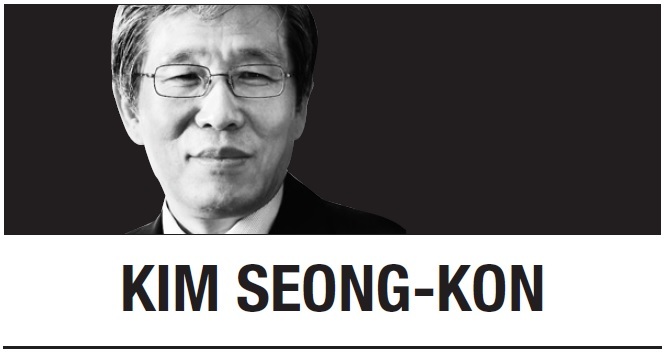[Kim Seong-kon] Between shame and fame, repelling and charming
By Kim Seong-konPublished : Feb. 3, 2021 - 11:26

To make matters worse, the hypocrites do not hesitate to do evil things under the pretense of good. Obviously, they believe that the end justifies the means. So they think they can sacrifice “lesser” goods for a greater good and they can do evil things as long as they serve la Grande Cause. They say: “If you want to kill a wolf, sometimes you need some sheep.” In that sense, they resemble terrorists who do not hesitate to sacrifice innocent lives, claiming that collateral damage is inevitable to accomplish their ideological goals.
Perhaps they do not know the famous phrase, Non faciat malum, ut inde bonum veniat, which means, “Do not do evil in order that good may come,” or “You are not to do evil that good may come of it.” Indeed, the end can never justify the means. No matter how noble the end is, it will lose nobility if the means to accomplish it is wrong.
There is another saying, “Evil comes in many forms, including ‘the Good.’” Indeed, there may be evil politicians who pretend that they are good people who can bring justice and fairness to our society. Oftentimes, they are nothing but unwise, stubborn ideologists who believe that our past was wrong, so they should straighten it out by punishing anyone who was involved. However, a maxim says, “You cannot change the past, but you can change the future.” Forgetting to heed this advice, our politicians try to change the past through political vendettas, only to fail to change the future.
A beautiful song by Ori illustrates what we should do about the past. The deeply moving lyric goes, “Maybe, maybe, maybe, you slept with someone else in the past/ But no one will love you, love you, love you like I do/ ‘Cause I will be your last.” What we need now is that kind of positive attitude toward the past.
Eventually, those hypocrites will fall down in shame and disgrace. It is a tragedy because life is too valuable to waste in humiliation and dishonor. Therefore, we must always try to live with decency, integrity, and honor. Then, we can protect our reputation and lead a worthy and excellent life. Unfortunately, however, many of us often make a wrong choice and end up disgraced and shamed.
In addition, life is short and soon we will retire and fade away. When aged, we will be full of woes and remorse, looking back upon our past lives. We will regret our wrong choices that have shamed us or ruined us. We may be rueful at our deathbed, but it will be too late because by choosing unwisely, we have irrevocably ruined our reputation and honor already. We cannot turn shame into fame. In his novel “On the Road,” Jack Kerouac wrote, “Something, someone, some spirit was pursuing all of us across the desert of life and was bound to catch us before we reached heaven. Death will overtake us before heaven.”
Between shame and fame, therefore, we should choose wisely, even though our choice gives us considerable disadvantages. Both shame and fame are long lasting. The difference is that shame destroys our reputation and family for good, whereas fame brings everlasting dignity and honor to us. If we were dishonest, corrupt, and deceitful, we would eventually disgrace our name and family. If we cheated on others, slandered our competitors or flattered the politically powerful, we would end up living in shame, too. On the contrary, if we lived decently and honorably and acted gracefully and ethically, we would be able to live in fame and honor.
People respect those who live honorably and count on them. When we lose credibility and no one can count on us, then our life is effectively over. That is why we should try to be of help to others and stay reliable and dependable even after retirement. As long as someone counts on us and we can be helpful to others, our lives are worthwhile. Then we can become adorable, charming people.
As we grow older, we come to realize that all is vanity, as King Solomon said in Ecclesiastes: “Vanity of vanities! All is vanity. What does man gain by all the toil at which he toils under the sun?” Why, then, do we have to disgrace our lives by choosing unwisely?
If we did shameful things, people would find us repulsive and despicable. On the contrary, if we lived in fame and honor, people would find us charming and admirable. Between shame and fame, or between repelling and charming, which one do we want to choose? The answer is obvious already.
Kim Seong-kon
Kim Seong-kon is a professor emeritus of English at Seoul National University and a visiting scholar at Dartmouth College. -- Ed.











![[Kim Seong-kon] Democracy and the future of South Korea](http://res.heraldm.com/phpwas/restmb_idxmake.php?idx=644&simg=/content/image/2024/04/16/20240416050802_0.jpg&u=)







![[Today’s K-pop] Zico drops snippet of collaboration with Jennie](http://res.heraldm.com/phpwas/restmb_idxmake.php?idx=642&simg=/content/image/2024/04/18/20240418050702_0.jpg&u=)